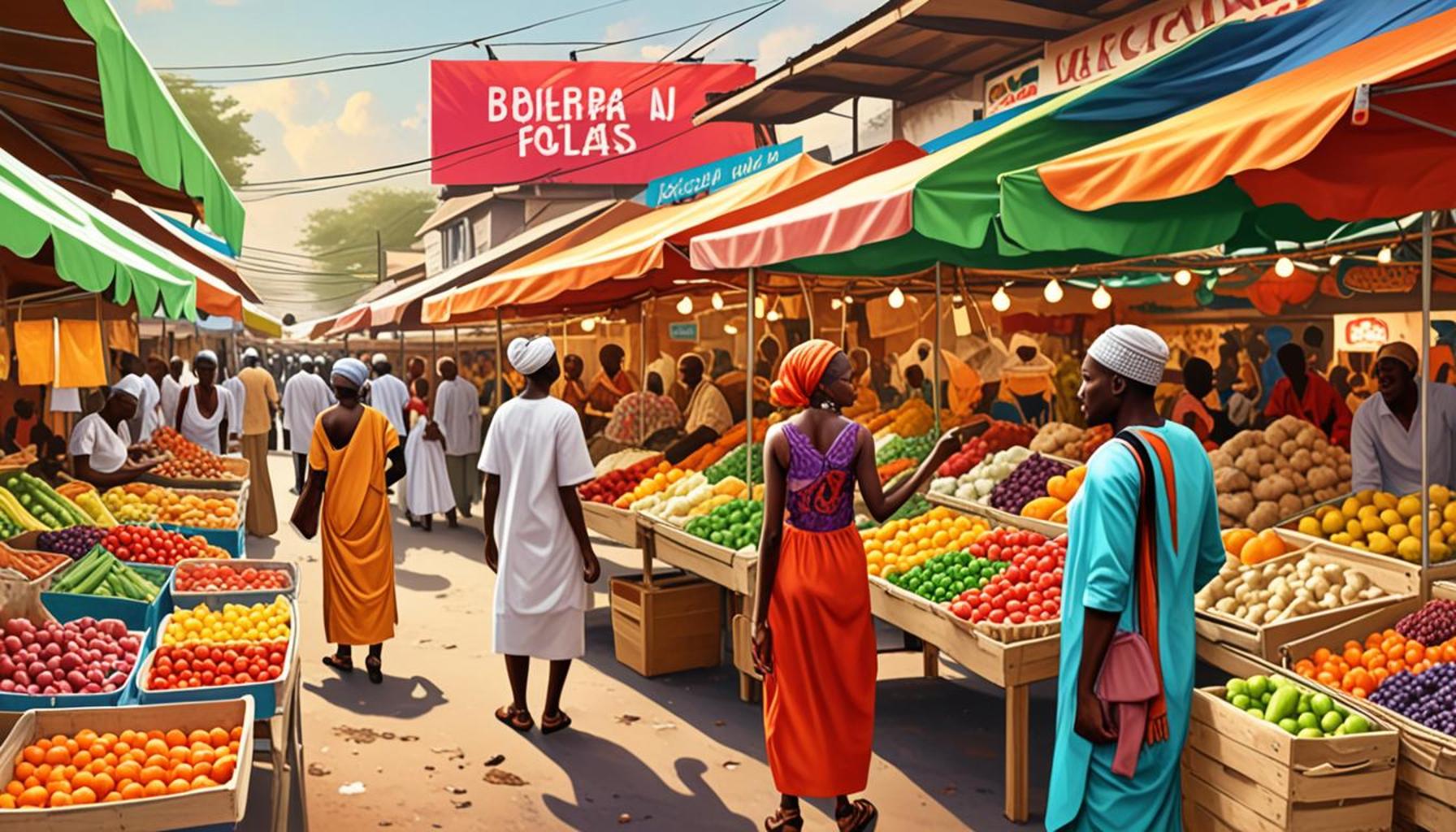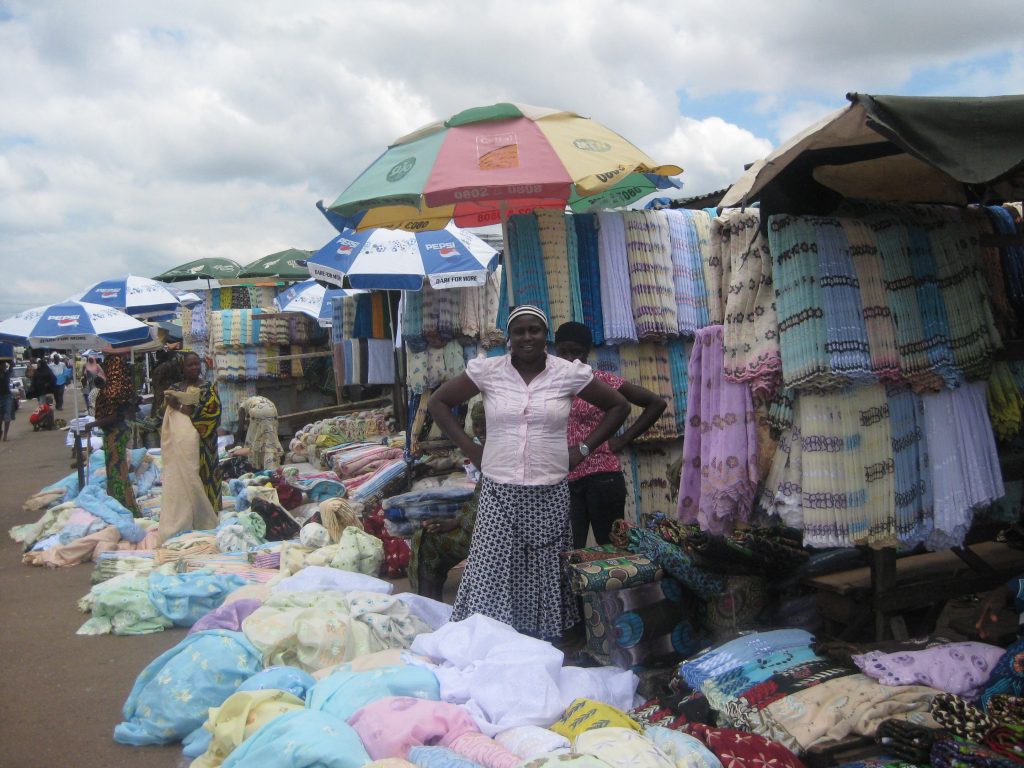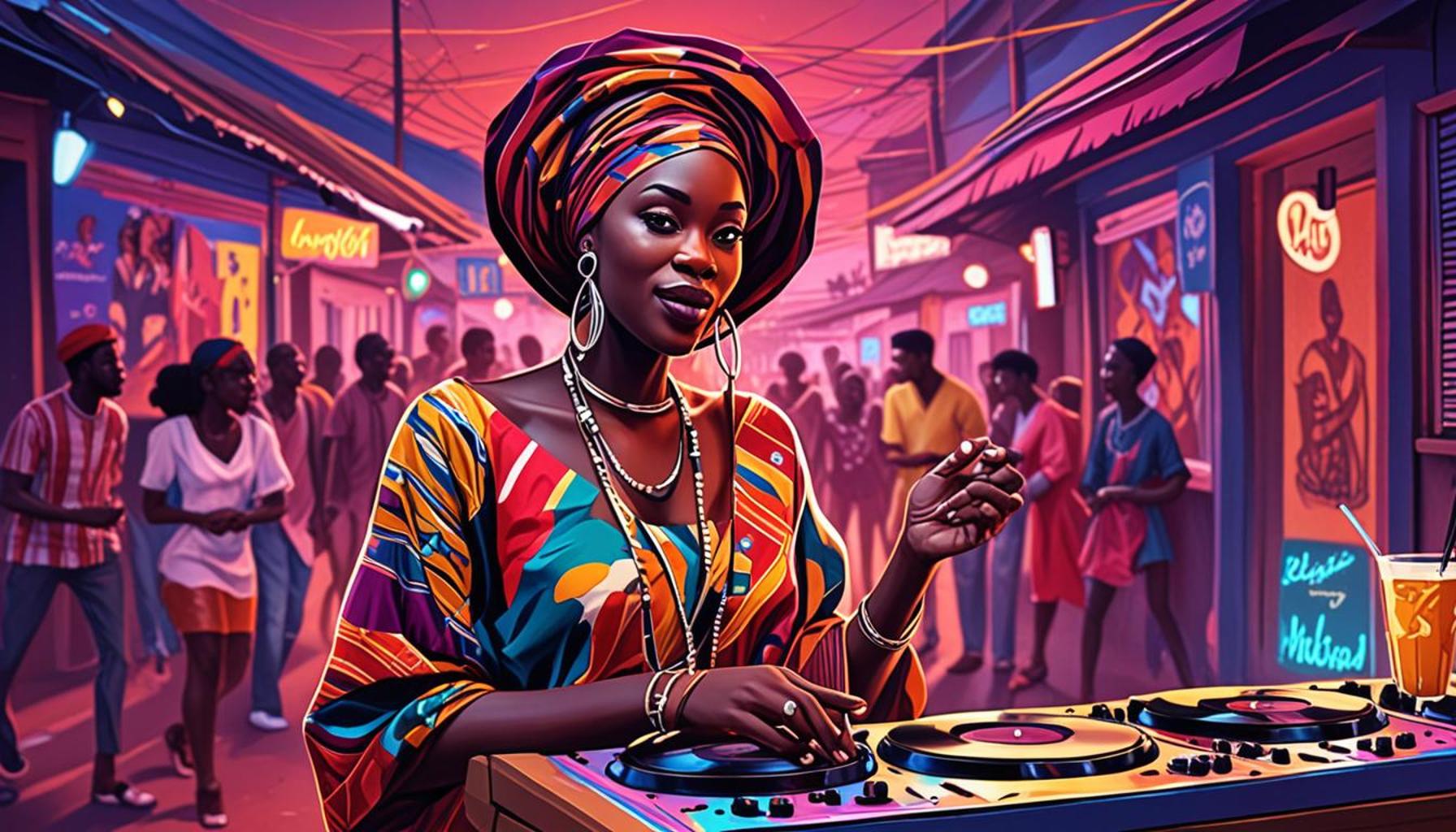Local Market Experiences: Shopping and Discoveries in Nigerian Markets

Exploring the Heartbeat of Nigeria: The Markets
Nigerian markets are not just places to shop; they are vibrant hubs of culture, community, and adventure. Stepping into a market is akin to experiencing the heartbeat of Nigerian life, where every stall tells a story and every seller plays a role in the rich tapestry of local traditions. The atmosphere is electrifying, filled with the passionate chatter of vendors and customers, the sweet and spicy aromas wafting through the air, and a dazzling array of colors that can only be found in the heart of Nigeria.
Whether you’re a local navigating your daily errands or a visitor seeking to immerse yourself in authentic experiences, the dynamics of these markets promise a treasure trove of unforgettable memories. From the bustling stalls overflowing with textiles to the vibrant displays of fresh produce, there is something for everyone.
What to Expect in Nigerian Markets
- Rich Variety of Products: Each market is a cornucopia of local treasures. For instance, in the popular Balogun Market in Lagos, shoppers can find everything from beautiful Ankara fabrics to intricate beadwork and artisan crafts. Meanwhile, the Kurmi Market in Kano is renowned for its indigenous pottery and colorful leather goods, offering visitors a chance to purchase unique items that reflect Nigeria’s diverse heritage.
- Cultural Exchange: Markets serve as melting pots where a multitude of ethnic groups converge. In places like the Onitsha Main Market, traders from various regions exchange not only goods but also stories and traditions, creating a vibrant tapestry of cultural interactions. This openness provides a glimpse into Nigeria’s rich heritage and fosters a sense of unity among its diverse population.
- Haggling Rituals: The art of negotiation is an integral part of the market experience. It’s not merely about price reduction; it’s a dance of social interactions where understanding, respect, and local customs come into play. Visitors are encouraged to engage in this tradition, which can be both thrilling and enlightening. Learning a few local phrases can enhance the experience and lead to deeper connections with vendors.
Each market, like Balogun and Kurmi, tells its own story through the products it offers and the diverse clientele it attracts. Engaging with local vendors not only enhances your shopping experience but can also lead to meaningful interactions filled with storytelling and rich exchanges of local knowledge. The blend of flavors, colors, and personalities makes every visit feel like a true journey through Nigeria.
This article will delve into the enchanting experiences found in Nigerian markets, guiding you through essential shopping tips, highlighting popular stalls, and uncovering hidden gems that are definitely worth a visit. Whether you are on the lookout for groceries, gifts, or simply an unforgettable experience, the markets of Nigeria promise a world that engages the senses and stirs the soul.
ADDITIONAL INSIGHTS: Expand your understanding here

Vibrant Marketplace Dynamics
Visiting Nigerian markets is an enriching experience that offers a blend of commerce and cultural immersion. These bustling hubs are alive with activity, and every stall presents an opportunity to discover not just products, but also the stories behind them. As you navigate through bustling aisles and maneuver around vibrant displays, the vibrant energy of these locales grips you, inviting you to engage with the local culture.
Essential Tips for Navigating Markets
To maximize your experience in Nigerian markets, consider the following tips that can help you seamlessly navigate through these vibrant spaces:
- Be Prepared for Crowds: Nigerian markets are often teeming with locals and visitors alike. Embrace the hustle and bustle, and remember that patience is key. Early mornings tend to be less crowded, making it easier to browse and interact with vendors.
- Carry Cash: While electronic payments are becoming more popular, many traders are still cash-based. Having Naira on hand allows for smoother transactions and can help you take part in the traditional haggling process.
- Stay Hydrated: The experience of wandering through a market can be physically demanding, especially in the heat. Always carry a bottle of water to keep yourself refreshed while you explore.
- Dress Comfortably: Wear loose, comfortable clothing and shoes that are easy to walk in. Markets require a fair amount of movement, and comfort is essential to enjoy the experience fully.
- Learn Basic Local Phrases: Having a few phrases in local dialects, such as Yoruba, Igbo, or Hausa, can significantly enhance your interactions with vendors. A simple “thank you” or “how much?” in the local language goes a long way in building rapport.
These tips serve as a guide to navigating through Nigeria’s vibrant markets with ease, ensuring you can fully immerse yourself in the experience. Each trip to a market presents new opportunities to connect, learn, and discover unique local products that reflect the country’s rich cultural heritage.
Diverse Culinary Treasures
Food lovers will find Nigerian markets a paradise teeming with flavors and aromas. Local markets serve as melting pots of ingredients, enabling you to purchase fresh produce, spices, and traditional delicacies all in one spot. From the aromatic scent of jollof rice spices to the colorful variety of fruits and vegetables, each visit can be a culinary adventure. The Makoko Fish Market in Lagos, for instance, is known for its fresh catch and vibrant seafood offerings, while the Sabon Gari Market in Kano is a cultural landmark for spices and traditional groceries.
As you explore these markets, take the time to indulge in street food. Sample local delicacies, such as suya (spicy grilled meat skewers), akara (bean cakes), or puff-puff (sweet fried dough balls). Each dish offers a flavorful insight into Nigeria’s diverse culinary scene, making food not just sustenance but also a gateway to understanding local traditions.
Deep Dive into Nigerian Market Culture
Nigerian markets are vibrant hubs of culture, where the essence of local life is palpable. Shopping in these markets transcends the mere exchange of goods; it becomes an experiential journey. Vendors often engage in animated dialogues with customers, offering tales that add layers of meaning to the products. For instance, a cloth seller may narrate the cultural significance of different fabrics, making every purchase infuse the shopper with local heritage.
Unique Discoveries Await
Venturing into a local market, such as the bustling Balogun Market in Lagos, showcases an array of goods ranging from exotic spices to hand-woven textiles that tell a story of their own. Seek out indigenous items that may not be easily available in mainstream stores, from artisanal crafts to local agricultural produce. Not only do these products contribute to a sustainable economy, but they also serve as treasure troves of unique finds. Connecting with local artisans provides insight into their craft and inspires appreciation for traditional skills.
Social Experiences that Enrich
Furthermore, shopping in Nigerian markets fosters community cohesion. As locals engage in bartering and bargaining, relationships are formed that extend beyond commerce. The markets serve as gathering spaces where individuals exchange experiences and cultures. Observing the colorful interactions can enhance one’s understanding of Nigerian traditions and social structures. The food stalls are also a pivotal part of this experience, where one can indulge in authentic Nigerian dishes, tantalizing the taste buds and providing a deeper connection to the local lifestyle.
| Advantage | Description |
|---|---|
| Cultural Immersion | Engaging with local vendors enhances understanding of customs and traditions. |
| Unique Products | Discover artisanal goods and local produce not found in commercial shops. |
This exploration into the heart of Nigerian markets not only supports the local economy but also enriches one’s perspective on the diverse cultural tapestry within Nigeria. Embracing these experiences can lead to newfound appreciation and connections that extend well beyond the marketplace.
SEE ALSO: Click here to read another article
Local Arts and Crafts: A Treasure Trove of Creativity
Nigerian markets are not only platforms for food and textiles; they are also vibrant showcases of local arts and crafts. An exploration into the handicrafts available at these markets reveals a plethora of unique items that reflect the rich cultural heritage of Nigeria. In places like the Arts and Crafts Market in Abuja or the Onitsha Main Market, one can find beautifully handcrafted goods ranging from intricate beadwork to striking traditional outfits.
Handmade Pottery, often characterized by colorful designs and unique forms, is a staple. Artisans pour their skills into each piece, using techniques passed down through generations. Visitors can view artists in action, shaping clay into stunning pots or figurines, offering a glimpse into the creative process behind each masterpiece. Additionally, items such as Adire fabric, a traditional Yoruba cloth dyed using a resist technique, portray the creativity and resourcefulness of Nigerian tailors and designers.
The opportunity to purchase art directly from its creators enables a personal connection with the culture of the region. Engaging with artisans provides an opportunity to learn about their techniques, inspirations, and the significance of their creations. As you explore these markets, look for items such as carved wooden sculptures, which often depict stories, mythology, or everyday life, allowing you to take home a piece of Nigeria’s rich narrative.
Fashion and Textiles: A Colorful Tapestry
No visit to a Nigerian market would be complete without diving into the world of fashion and textiles. Markets such as the Balogun Market in Lagos bristle with fabrics of all hues and patterns, from the richly textured Kente cloth to vibrant Ankara prints. Shoppers can appreciate the craftsmanship involved in producing these fabrics, often featuring elaborate designs reflective of various ethnic groups.
Textile shopping in Nigeria is as much about the experience as it is about the purchase. Expect to spend time sifting through piles of colorful fabrics, each telling a story, and interacting with vendors who can provide insights into the symbolism of particular patterns and colors. Moreover, after selecting fabrics, many markets offer the service of local tailors who can transform your purchase into custom-made clothing, beautifully tailored to your specifications.
Flea Markets: Uncovering Hidden Gems
Flea markets scattered throughout Nigerian cities invite curious shoppers to uncover hidden gems. The Ogba Market in Lagos, for instance, is filled with an assortment of second-hand goods, where you can find everything from vintage electronics to quirky home décor items. These markets are often less commercial and more eclectic, providing shoppers with the thrill of discovery.
As you explore, keep an eye out for antiques and collectibles, which can add a touch of history and character to your home. The charm of flea markets lies in their unpredictability; you never know what you might find. Merchandise ranges from traditional home goods to contemporary items, allowing you to curate a unique collection that tells the tale of your travels and experiences in Nigeria.
Engaging with local vendors also opens the door to storytelling, where each product harbors a personal history, connecting you more deeply with Nigerian culture. The friendly atmosphere, combined with the joy of unearthing something special, makes flea markets a must-visit when exploring the market scene in Nigeria.
RECOMMENDED: Check out this similar article
Conclusion: Embracing the Vibrancy of Nigerian Markets
In summary, the allure of Nigerian markets lies in their rich tapestry of culture, creativity, and community. From the mesmerizing displays of local arts and crafts to the colorful array of fashion and textiles, each market visit unveils a deeper understanding of Nigeria’s diverse traditions and history. Engaging directly with artisans and vendors not only enhances the shopping experience but also fosters a personal connection to the stories woven into every product.
Flea markets offer a unique charm, encouraging exploration and the chance to unearth hidden treasures that can add character to any space. These lively marketplaces are more than just shopping destinations; they are cultural hubs where the collective heartbeat of Nigerian life can be felt. The vibrant exchanges and the sense of harmony amongst buyers and sellers create a rich atmosphere that beckons you to participate in a communal celebration of life.
As you navigate through these bustling markets, remember that each item holds a piece of Nigeria’s identity, inviting you to be part of a larger narrative. Whether you are a local or a visitor, the experience of shopping in Nigerian markets is one filled with discovery and connection. Dive into the local market experiences, and allow yourself to be captivated by the sights, sounds, and stories that await you. The treasures you find will not only adorn your home but will also enrich your understanding of Nigeria’s vibrant culture.


